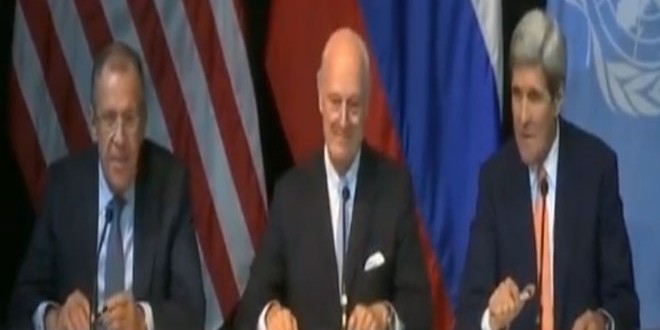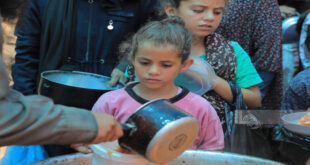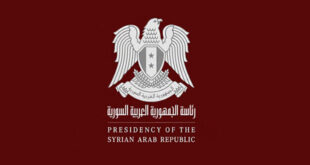Vienna, SANA – The expanded meetings on the level of foreign ministers held in Vienna to discuss means of pushing forward the political settlement for the crisis in Syria concluded its activities on Friday.
In a joint press conference with US State Secretary John Kerry and UN Special Envoy on Syria Staffan de Mistura on Friday evening following the talks, Russian Foreign Minister Sergey Lavrov said that agreement was reached during the Vienna talks on the need to preserve the unity and secular nature of Syria, preserve its state institutions, protect the rights of Syrians of all ethnicities and religious groups, provide humanitarian aid, and continue providing aid to refugees and displaced people.
Lavrov asserted that “we don’t want terrorists to assume power in Syria,” adding that the sides attending the talks agreed upon the need to fight terrorism and on placing more groups on the list of terrorist organizations.
He stressed that the “future of President al-Assad is decided upon by the Syrian people as a result of the political process,” and that the participants in the meeting agreed that this process which must be purely Syrian and belong to the Syrians who will decide their country’s future on their own.
The Minister said that Russia supports the process of fighting terrorism which must be based on international laws and accords, adding that this process must be conducted with the approval of the governments involved or via a Security Council resolution.
He said that the participants in the Vienna talks discussed the idea of announcing a ceasefire in parallel with a political process, and that they agreed to continue these discussions with the participation of the UN taking into account that even if agreement is reached over a ceasefire, terrorist organizations will not be part of it, adding that a unified agreement in this regard hasn’t been reached.
However, Lavrov said that agreement was reached by all sides on wanting to address the UN to bring the Syrian government and opposition groups together to initiate the political process that leads to agreement among sides, adding that they also agreed that the elections should be observed actively by the UN and must include all Syrians, including refugees in neighboring countries, regardless of their affiliations.
The Minister was confident that the principles formulated at the Vienna meeting will launch serious efforts, and that all participants were open to finding middle-ground solutions, hoping that this openness will manifest in upcoming meetings will be held after two weeks.
He also noted that his country proposed joint coordination in counter-terrorism operations in Syria to the United States, but the Americans were content to limit coordination to mechanisms for prevent accidents in Syrian airspace, adding “we’re confident that we can do more than that and work more effectively against terrorists.”
In turn, Kerry said that the participants in the meeting agreed that the unity, independence, border integrity, and secular nature of Syria are essential issues, and that Syrian state establishments must remain, in addition to agreeing upon the need to speed up diplomatic efforts to end the war, and to fight ISIS and other terrorist organizations, adding that they all believe that ISIS and other terrorist organizations mustn’t be allowed to unite and control Syria.
While the State Secretary couldn’t refrain from reiterating his calls for interfering in the Syrians’ decision over who rules them despite his acknowledgement that the Syrians are the one who will decide their country’s future, Kerry stressed that disputes among the sides attending the Vienna meeting mustn’t hinder diplomatic efforts to resolve the crisis in Syria, acknowledging that the political process via UN-sponsored dialogue between the Syrian government and the opposition is the only way to resolve the crisis.
For his part, de Mistura said that another meeting of the same group, which he called a “special contact group on Syria,” will be held in two weeks, and if it succeeds, there will be a meeting at the negotiations table that brings together the Syrian government and the opposition.
On a relevant note, High Representative of the European Union for Foreign Affairs and Security Policy Federica Mogherini said in a press conference that points of agreement were reached during the Vienna meeting which she described as “historic.”
Mogherini noted that there are still problems and that the meeting wasn’t easy, but points of agreement were reached nonetheless, and that later international communications regarding Syria will be conducted under UN supervision.
In the same context, Lebanese Foreign Minister Gebran Bassil, who attended the talks, said in a statement following the meeting that the essential principles for resolving the crisis in Syria revolve around the word “unity” on three levels: unity of Syrian land, unity of the Syrian people, and the unity of the international community in working to resolve the crisis and fighting terrorism.
Bassil also called for including the element of rebuilding Syria as part of the solution, because this element encourages all Syrians to become involved in the solution.
The expanded Vienna meeting brought together the foreign ministers of sixteen countries: Russia, the US, Iran, China, Saudi Arabia, Turkey, the United Arab Emirates, Qatar, Jordan, Germany, France, Egypt, Italy, Britain, Iraq, and Lebanon, in addition to de Mistura and Mogherini.
A quartet meeting on Syria that brought together the foreign ministers of Russia, the US, Turkey and Saudi Arabia was held on Thursday in Vienna, only a week after a similar meeting had earlier taken place.
Hazem Sabbagh
 Syrian Arab News Agency S A N A
Syrian Arab News Agency S A N A




